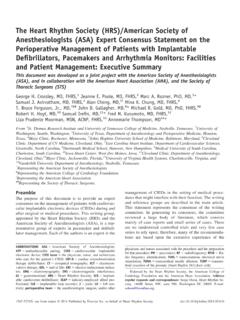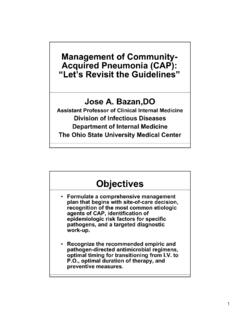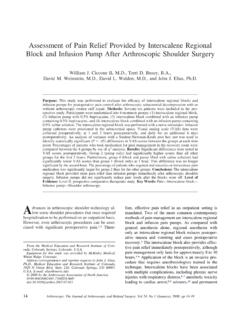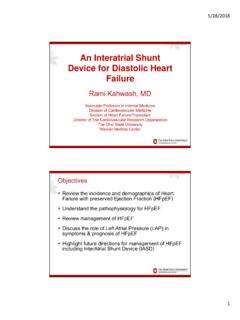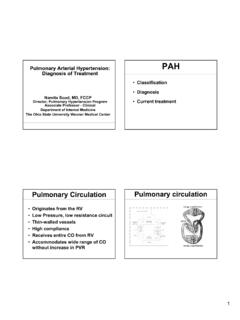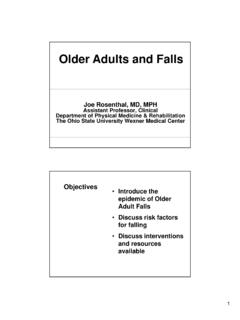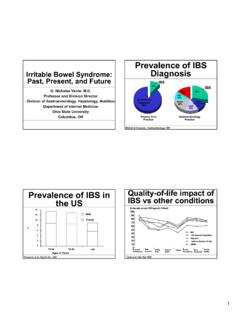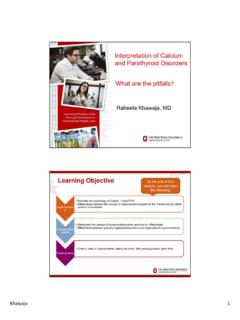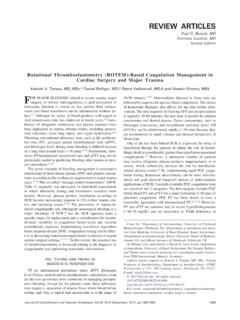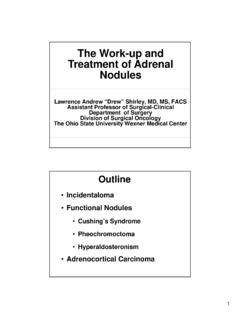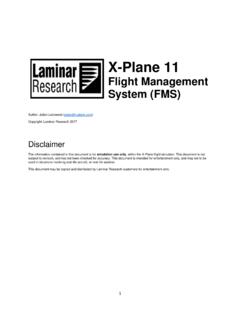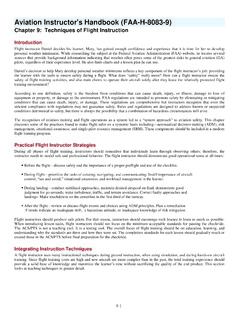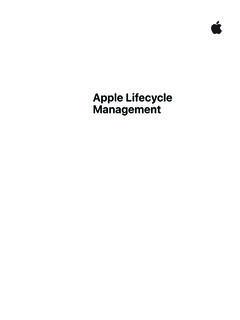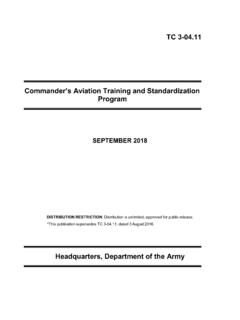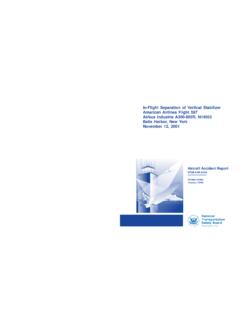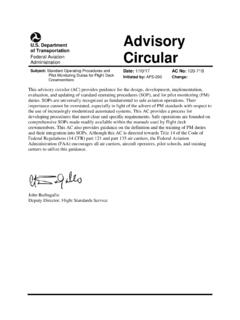Transcription of The Management of Stress - OSU Center for Continuing ...
1 Stress Management : Part 1 Stress and Health Emily K. Porensky, PhD. Assistant Professor, Department of Psychiatry and Behavioral Health Department of Psychology The Ohio State University Wexner Medical Center What is Stress ? Stress arises when individuals perceive that they cannot adequately cope with the demands being made on them or with threats to their well-being.. Lazarus, (1966). 1. The Stress Process Self- Efficacy Threat Challenge Expectation Harm/Loss What What can does this I do? mean? Stressful Primary Secondary Stress &. event or Appraisal Appraisal COPING. situation Is all Stress bad?
2 The Yerkes-Dodson Law Author: Vaughan 2. Common Life Stressors Death Divorce Loss of a job Starting a new job Finances Getting married Moving Chronic illness or injury Interpersonal conflict Taking care of an elderly or sick family member Work-Related Stressors Being unhappy in your job Having a heavy workload or too much responsibility Working long hours Unclear expectations or no say in decision- making Working in dangerous conditions Insecurity about advancement or risk of termination Having to give speeches in front of colleagues Facing discrimination or harassment 3. Impact of Stress 60-80% of outpatient visits may be related to Stress (Rosch, 1991; Avey, Matheny, Robbins, & Jacobson, 2003)).
3 Linked to all leading physical causes of death - heart disease, cancer, stroke (Cohen, Janicki-Deverts, & Miller, 2007). Associated with development of most major mental health problems depression, PTSD, pathologic aging (Marin et al., 2011). Impact of Stress Affects fetal development & outcomes (Kinsella &. Monk, 2009). CDC/ Jim Gathany Predicts negative health behaviors and relapses . smoking, alcohol abuse, illicit substance use, sleeplessness (Kassel, Paronis, Stroud, 2003;. Herman,, 2012;; Ellis,, et al.,, 2012)). CDC/ Debora Cartagena 4. Primary Care: Stress Management Counseling National study suggests that only 3% office visits included Stress Management counseling b primary by i h i i care physicians (Nerurkar, 2012; JAMA Internal Medicine).
4 42% report receiving no instruction regarding Stress and health outcomes in medical education 76% lacked confidence in their ability to counsel patients about Stress 49% indicated a lack of referral sources (Avey, Matheny, Robbins, & Jacobson, 2003). Do as I say Not as I do . 57% of outpatient medical clinic providers (physicians, residents, NP's, and PA's). reportt rarely . l or never . practicing ti i Stress t reduction techniques themselves Those who do practice use the following: - exercise (70%) - meditation (32%). - imagery (26%) - deep breathing (21%). - mindfulness(16%) - PMR (16%).
5 (Avey, Matheny, Robbins, & Jacobson, 2003). 5. Stress Management : Part 1 Stress and Health Sharla Wells-Di Gregorio, PhD. Assistant Professor of Psychiatry and Behavorial Health, Psychology & Internal Medicine Clinical Cli i l Psychologist, P h l i t PPsychosocial h i l Oncology O l Director, Psychosocial Oncology Fellowship Program The Ohio State University Wexner Medical Center How does Stress get under the skin? Fight or Flight responses: SAM activation HPA activation Allostatic load 6. Fight or Flight Hypothalamic Pituitary Adrenal Axis (Glaser & Kiecolt-Glaser, 2005).
6 7. Allostatic Load (Juster, McEwen & Lupien, 2010). Diseases and Illnesses Caused by Stress Seaward, B. (1999). Managing Stress : Principles and Strategies for Health and Wellbeing. Boston, Mass: Jones and Bartlett. Original image in the public domain - Author: Bougl , Julien 8. Benefits of Stress Reduction Better concentration/focus More stable moods Improved communication/relationships Better physical health Increased sense of control of time and activity CDC/Amanda Mills References Avey, H., Matheny, K. B., Robbins, A., & Jacobson, T. A. (2003). Health care providers'. training, perceptions, and practices regarding Stress and health outcomes.
7 Journal of the National Medical Association, 95(9), 833. Cohen, S., Janicki-Deverts, D., & Miller, (2007). Psychological Stress and disease. JAMA, 298, 1685-1687. Ellis, , Gehrman, P., Espie, , Riemann, D., & Perlis, (2012). Acute insomnia: Current conceptualizations and future directions. Sleep Medicine Reviews, 16, 5-14. Glaser, R. & Kiecolt-Glaser (2005). Stress -induced immune dysfunction: Implications for health. Nature Reviews: Immunology, 5, 243-251. Herman, (2012). Neural pathways of Stress integration: Relevance to alcohol abuse. Alcohol Research: Current Reviews, 441-447.
8 Kassel, , Paronis, & Stroud, (2003). Smoking, Stress and negative affect: Correlation, causation, and context across stages of smoking. Psychological Bulletin, 129, 270-304. Kinsella, & Monk, C. (2009). Impact of maternal Stress , depression, and anxiety on fetal neurobehavioral development. Clinical Obstetrics & Gynecology, 52, 425-440. Lazarus, (1966). Psychological Stress and the coping process. New York: McGraw- Hill. Hill Marin, M-F., Lord, C., Andrews, J., Juster, R-P., Sindi, S., Arsenault-Lapierre, G., Fiocco, , & Lupien, (2011). Chronic Stress , cognitive functioning, and mental health.
9 Neurobiology of Learning and Memory, 96, 583-595. Nerurkar, A., Bitton, A., Davis, R. B., Phillips, R. S., & Yeh, G. (2013). When Physicians Counsel About Stress : Results of a National Study. JAMA internal medicine, 173(1), 76- 77. Rosch, P. J. (1991). Job Stress : America's leading adult health problem. USA Magazine, 2. Yerkes, & Dodson, (1908). The relation of strength of stimulus to rapidity of habit-formation. Journal of Comparative Neurology & Psychology, 18, 459-482. 9. Stress Management : Part 2 Interventions Sharla Wells-Di Gregorio, PhD. Assistant Professor of Psychiatry and Behavorial Health, Psychology & Internal Medicine Clinical Cli i l Psychologist, P h l i t PPsychosocial h i l Oncology O l Director, Psychosocial Oncology Fellowship Program The Ohio State University Wexner Medical Center Strategies that DO NOT work Try to be more positive.
10 Everything will be okay.. Just stop worrying Just worrying.. ( , Don't worry, be happy.). Thought stopping (Wegner, 1994). Avoidance & numbing Alcohol or drug use Distraction Di t ti & procrastination ti ti Anxiolytics CDC/Debora Cartagena 77% of the chronically anxious can improve with cognitive (thought) and behavioral (action) strategies 10. Cognitive Behavioral Therapy (CBT). Structured, brief and time-limited therapy Focused on current behavior Empirically-supported to treat a range of clinical problems, including: Anxiety disorders and insomnia p Depression Eating disorders Chronic pain Butler, Chapman, Forman & Beck, 2006.
